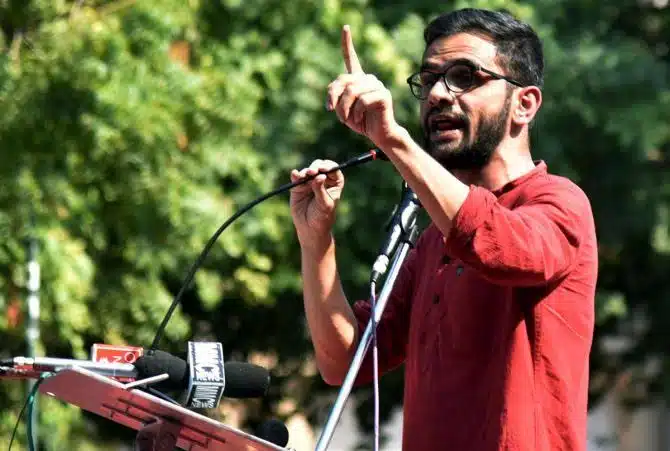Unlawful Activities (Prevention) Act charges have been filed against student activist Umar Khalid and numerous others. He turned his lifelong concern for social and political issues into political action at JNU, where he rose to the position of DSU president.
Background
The High Court, which has been hearing the bail application for a month, declared on April 22 that Khalid’s remark was “obnoxious” and “unacceptable” and could “incite” people. Once independent, democracy rendered revolution unnecessary. Umar Khalid’s bail was denied when the Delhi High Court cited Nehru in its decision.
Umar Khalid is one of the many people charged with conspiracy in connection with the February 2020 unrest, in Northeast Delhi. He was arrested and charged under the harsh anti-terror UAPA law. On September 13, 2020, he was taken into custody. Since then, he has been detained by the authorities.
The Citizenship Amendment Act(CAA), which is extremely biased, was passed in 2019. Protests were held around the country, with Delhi’s Shaheen Bagh serving as the epicenter. Umar protested against this law since he disagreed with it. In a 17-minute address on the topic, he emphasized the importance of maintaining non-violent protests.
Instead of arresting the instigators of the riots in Delhi, the police falsely accused innocent bystanders participating in the violence. Consequently, several college students were taken into custody, which also included Umar.

Case Study by the Court
On Monday, the Delhi High Court noted that a speech given by Umar Khalid, one of the accused in the major conspiracy case of the 2020 Delhi riots, during the anti-CAA protests was in poor taste and may have amounted to slander, but was not “terrorist activity.”
Umar Khalid, an activist and former student leader at Jawaharlal Nehru University (JNU), had his bail application dismissed by the Delhi High Court on Tuesday as part of a bigger conspiracy case involving the 2012 riots in Northeast Delhi.
Khalid’s attorney told the court, “I have to bear the brunt of two years of imprisonment because you have a statement. The prosecution really needs to make up its mind as to what is the case against me.”
The order on the activist’s bail petition was made by a special division bench consisting of justices Sidharth Mridul and Rajanish Bhatnagar. The purchase order was held on September 9. The bench cited the lower court’s conclusion that Khalid had participated in multiple meetings held via the WhatsApp group Muslim Students of JNU between December 2019 and February 2020. From the outset of the conspiracy to its climax in the subsequent disturbances, the HC noted, Khalid’s name was frequently brought up.
The bench ruled that the bail appeal was without merit and dismissed it.
Khalid is charged with conspiracy in connection with the riots that broke out in Northeast Delhi, in February 2020. He was arrested and charged under the harsh anti-terror UAPA law. On September 13, 2020, he was taken into custody. Since then, he has been detained by the authorities.

To say something is offensive does not constitute a terrorist act. This is something that we fully get. The fact that the remark was deemed objectionable by the prosecution is not a crime in and of itself. In other words, we’re going to give them a shot. It was revolting and offensive. It might be as damaging as slander.
While hearing the bail application of the ex-JNU student, a bench of Justices Siddharth Mridul and Rajnish Bhatnagar said, “It may tantamount to other offences but it does not amount to a terrorist action.”
During Monday’s session, Khalid’s attorney Sanya Kumar delivered statements from many confidential witnesses in an effort to prove that no one present at the alleged January 2020 meeting in Seelampur dubbed it a “secret meeting” organized by anti-CAA activists.
The bench said in its order that it was “difficult to form an opinion that there are not reasonable grounds for believing that the accusation against the petitioner is prima facie not proved” after reviewing the charge sheet and considering the fact that the appellant was in constant touch with other co-accused persons, including Sharjeel Imam, who is arguably at the head of the conspiracy.
The former JNU student leader had challenged the trial court order of March 24, 2020, denying him bail in the case.
The Supreme Court ruled against him, saying the Additional Sessions Judge’s ruling should stand as it is. Nothing in the ruling, however, shall constitute “an expression of any opinion on the merits of the case,” as the court ruled.
Obtaining a witness to testify is currently all that is required, under UAPA. The trouble with this case is that I have been arraigned, he added, adding that the charge sheet presented by the Delhi Police was without merit. Umar’s continued incarceration is a slap on the face of justice, given his history of advocating for and leading only peaceful rallies.
Umar Khalid and his Detention
Umar taped a video before his detention, in which he stated categorically that his impending arrest was an attempt to intimidate and silence him and others like him who were speaking out against the government’s policies. He said that in the face of such threats, the only appropriate response was to remain unfazed and uncowed.

Umar Khalid’s life is illustrative of his bravery, sensitivity, and social dedication, as well as the period in which he lived, in which criticism of the establishment is considered sedition and protest against government policies is viewed as a terrorist action.












